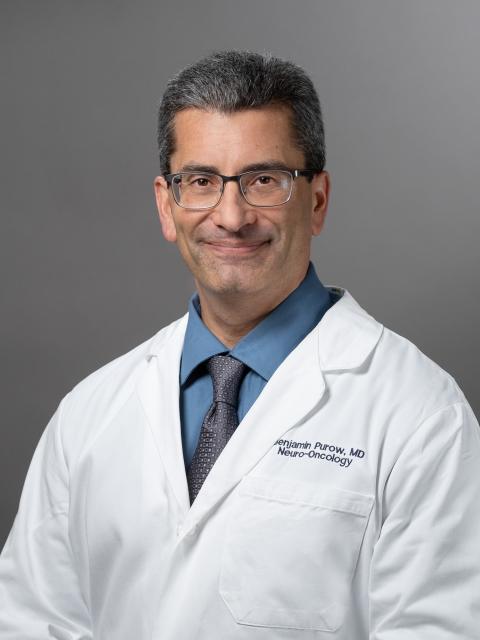
Benjamin W Purow, MD
Neurology
Additional Locations
Bio & Overview
Benjamin Purow received his B.A. in chemistry and physics cum laude from Harvard University in 1991 and his M.D. from Johns Hopkins Medical School in 1996. From 1994-1995, he was a Howard Hughes Medical Institute (HHMI) medical student fellow in the laboratory of Hyam Levitsky at Johns Hopkins. Dr. Purow completed a residency in pediatrics at Children’s National Medical Center in Washington, DC, followed by fellowship training in pediatric hematology/oncology and in neuro-oncology at the NIH.
Dr. Purow spent several years pursuing brain tumor research in the laboratory of Howard Fine at the NIH, during which he was the first to show a role for the Notch pathway in gliomas. He obtained his first independent position in 2006 as an assistant professor in neuro-oncology at the University of Virginia in Charlottesville.
Dr. Purow spends 75-80% of his time leading his laboratory and 20-25% in clinical care of patients with brain tumors. His laboratory focuses on the diacylglycerol kinases as targets in cancer, on microRNAs in glioblastoma and on novel ways to target the underlying molecular circuitry in brain tumors. The Purow laboratory is supported by grant awards from the NIH and from generous private donors.
Academic Information
- Gender
- Male
- Languages
- English
- Age Groups Seen
- Infants (0-2)
Children (2-12)
Adolescents (12-21)
Adults (21-65)
Older Adults (65+)
- Primary Education
- Johns Hopkins University
- Residency
- Children's Hospital National Medical Center
- Fellowships
- National Institutes of Health Clinical Center
- Certification
- American Board of Pediatrics (Pediatrics)
- Additional Specialties
- Pediatric Neuro-Oncology
Highlights
Meet Neuro-Oncologist, Benjamin Purow, MD
I'm Benjamin Purow, one of the neuro-oncologists here at the University of Virginia. I spend about three quarters of my time doing research against some of the worst of the brain tumors that are out there and I spend a quarter of my time seeing patients, mostly with brain tumors. We give many patients treatments with things like chemotherapies, some patients we're just observing them over time with brain MRI scans, watching their tumors and they don't need any treatment. We have a number of patients who are on clinical trials getting some kind of experimental therapy. It's really quite a mix of patients that we see in clinic. I actually started my training first in pediatrics and then in pediatric oncology, children with cancer. I really found myself getting pulled into neuro-oncology and while I certainly hope to have an impact more broadly in cancer and pediatric cancer, adults with cancer, neuro-oncology really just hit me as a field where, we're so desperate to come up with new treatments, there's so much we need to understand, so I think here at the University of Virginia we've got a fairly unique combination of giving the state of the art treatments, but also at the personal level really being there for patients. Sometimes the best part of my day is seeing an MRI that shows improvement on a patient or even just stopping the growth of the tumor that had been very aggressive. That's really a fantastic feeling and quite a rush. We really want to give patients and their families as much support as we can.
Awards
- 2011-2020 Best Doctors in America® List
Reviews
135 Patient Satisfaction Ratings
Our patient satisfaction ratings are an average of all the survey responses to the below questions a provider got within the past 2 years. To protect your privacy, patients aren't identified.
See more about our patient satisfaction surveys .